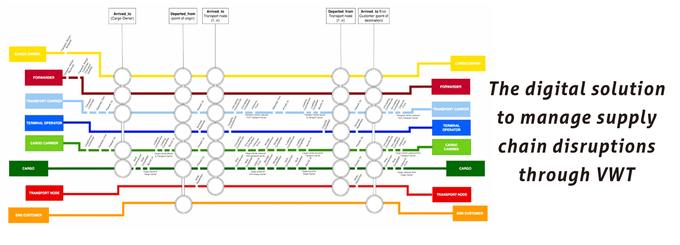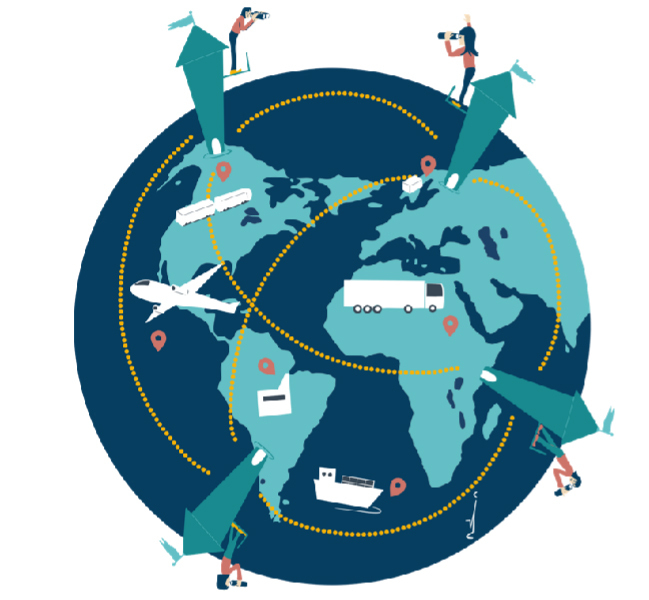
The economy of the Republic of Korea is export-driven with exports reaching its peak so far in 2012 with 54.09 percent of gross domestic product (GDP). The latest value from 2022 is 48.26 percent. Hence, about half of the economy depends on exports and the fluidity, reliability, and efficiency of its supply chains. Like other countries, the Republic of Korea is dependent on predictable, environmentally sound, and costefficient flows of goods coming into the country, both as components being used to produce goods to be consumed or exported. Smooth imports and exports is a prerequisite for supply and wealth of the Korean society. This need drove the creation of the cargo owner-driven terminal-centric Virtual Watch Tower / VWT network and community (www.virtualwatchtower. org), a digital solution and diverse group of actors of the global supply chain ecosystem that joined forces in an initiative led conjointly by Research Institutes of Sweden (RISE), Institute of High Performance Computing (IHPC)/ Agency for Science, Technology and Research (A*STAR). The VWT is a middleware and decentralized networked system-of-systems to better deal with supply chain challenges like disruptions and greenhouse gas emissions. The solution enhances existing data sets and freight management solutions. The VWT applies a minimalist approach and avoids overlaps with existing solutions to the maximum extent possible.

The cargo owners’ pain points
The ones most interested in the smooth flow of goods are the cargo owners, i.e., the transport buyers that need to live up to the promises given to their customers. In numerous conversations and working sessions cargo owners pointed towards a lack of visibility particularly when disruptions emerge. If disruptions are managed properly cargo owners and other actors can first, profit from cost savings while second, increasing customer satisfaction and retention which together drive topline a nd b ot t om-l i ne growth. Benefits include avoidance of expensive emergency air transport, freed up capital, and more precise emission data to achieve compliance and differentiation. Society gains through reduced emissions resulting in improved health and well-being of citizens. At the core of the solution sit visibility and situational awareness brought about by digital means, which are a pre-requisite for managing disturbances and disruptions which have been occurring increasingly across global supply chain networks engaging a large set of autonomously acting transport and logistics services.
The root-cause of the challenges
The cause for suboptimal supply chain performance is seen by experts in the lack of alignment and collaboration across supply chain networks. A situation that many people in the industry have been discussing for a long time. The cha llenge to overcome: each actor optimizes their own operations. We have to remind ourselves the benefits of coopetition. We can compete on the market but can collaborate on matters like the mitigation of supply chain risks and the reductions of Scope 3 emissions. The reward of collaboration is high. Situational awareness can translate into more accurate calculations and better decision-making. Empowering a community through collaboration and digitalization is exactly what motivated the creation of the VWT.
An open system-of-systems solution
The VWT is a hybrid human-machine solution. The community is built around an intelligent digital middleware that connects V W Ts of different member organizations. The VWT can be perceived as an internet of VWTs (VWTnet). Furthermore, the VWT offers collaboration tools like pop-up situation rooms for discussing analytical results and potentially align action where of collective interest. The VWT initiatives is supported by a range of industry partners and advisors. This includes cargo owners/ transport buyers like Alleima Tube, BDP International, Einride, Ericsson, Scania, and Stora Enso; logistics value chain services providers like PSA International, MSC, Green Cargo, GDL, Wallenius SOL, and Yilport; technology firms and equipment manufacturers such as Cargotech with Kalmar and Bromma, HERE Technologies, Marine Benchmark; and knowledge partners like Gothenburg University, Chalmers University of Technology, VTT, and Umeå University. Kvarken Ports, Port of Gävle, Helsingborg Port, and the Swedish Ports Association are also part of the emerging VWT ecosystem. The community represents main parts of the ecosystem with lots of room to grow; new members will be onboarded along the way. The Republic of Korea as a strong export and maritime nation is particularly invited to join to benefit from the advantages that the VWT offers.
Mitigating risks
System initiatives can fail as the recent discontinuation of Tradelens due to lack of commercial viability shows. Many believe that such systems need to be impartial and carried by a spirit of collaborative effort and sharing of benefits. This spirit is at the centre of the the VWT. The VWT project as it has been kickedoff earlier this year is conceived as a decentralized and neutrally led initiative at the beginning of its journey towards increased collaboration and digitalization for economic and societal value.
Not new but different
Collaboration and digitalization are key components to manage supply chains in volatile, uncertain, complex, and ambiguous times with an unclear economic outlook. Together we are stronger than alone, which is particularly true in a fragmented self-organizing ecosystem like the global supply chain network where the outcome of the whole depends on the performance of the weakest link in the chain network.
About the authors
Mikael Lind is the world’s first (adjunct) Professor of Maritime Informatics engaged at Chalmers and Research I nst it utes of S we den(RISE). He is an expert contributor at World Economic Forum, Europe’s Digital Transport Logistic Forum (DTLF), and UN/ CEFACT. He is co-editor of the first two books on Maritime Informatics, co-author of the Practical Playbook for Maritime Decarbonisation, and co-editor of the book on Maritime Decarbonization.
Wolfgang Lehmacher is a partner at Anchor Group and advisor at Topan AG. The former Director at the World Economic Forum and CEO Emeritus of GeoPost Intercontinental is an Advisory Board Member of The Logistics and Supply Chain Management Society, Ambassador F&L, Advisor GlobalSF, Advisor RISE, and a member of think tanks Logistikweisen and NEXST. He is co-author of the Practical Playbook for Maritime Decarbonisation and co-editor of the book on Maritime Decarbonization.
Lukas Kim is Currently a senior manager at NSONESOFT, his main scope of work includes analysis of international maritime standards and trends, and promotion of global maritime cooperation. He recently was the operation manager for ’23 Digital@Sea Asia-Pacific Conference and ’23 Workshop on Enhancing Safety of Navigation by Digital Means
Grace Oh i s t h e Chairperson of the Swedish Chamber of Commerce in Korea. With over 20 years of experience at Tetra Pak, the world-leading food processing and packaging solutions company, she currently holds the position of Regional Communications Director based in Seoul, Korea. Grace comes with a diverse global background that spans from Hong Kong to the United Kingdom and is an expert of Strategic Communication and international collaboration.

















